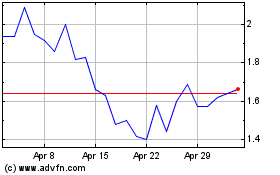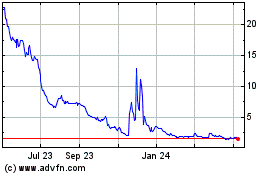- Continued expansion of IP portfolio related to RNA delivery
- Treatment of rheumatoid arthritis as one of the key therapeutic
indications
HAMILTON, BERMUDA / May 1, 2024 / Altamira
Therapeutics Ltd. (“Altamira” or the “Company”) (Nasdaq:CYTO), a
company dedicated to developing and commercializing RNA delivery
technology for targets beyond the liver, today announced that it
has filed a provisional patent application with the United States
Patent Office (USPTO) which covers nanoparticles comprising the
Company’s OligoPhore™ platform and siRNA targeting the p65 protein,
a component of the NF-κB transcription factor.
The provisional patent application describes
novel nanoparticle compositions based on OligoPhore, Altamira’s
peptide-based oligonucleotide delivery platform, or derivatives
thereof in combination with siRNA sequences designed to silence
p65. Activation of p65 has been observed in multiple types of
cancer as well as in many inflammatory diseases and its function
has been implicated in the pathogenesis of these diseases. For
instance, p65 is a well-known key checkpoint in rheumatoid
arthritis (RA) inflammation, and thought to regulate cell
proliferation, cell death, and stimulate metastasis in cancer. The
new filing is intended to extend Altamira’s intellectual property
related to its AM-411 development program for RA treatment, among
others.
“We consider the treatment of arthritis one of
the most promising applications of our OligoPhore RNA delivery
platform,” commented Covadonga Pañeda, Ph.D., Altamira
Therapeutics’ Chief Development Officer. “With our AM-411 program,
we have demonstrated in vivo that we can deliver siRNA specifically
to inflamed tissues, which in the case of RA is primarily the
inflamed joints. The treatment is thus sparing non-inflamed tissues
and avoiding the systemic side effects frequently observed with
current treatment options. In addition, using siRNA to knock down
the p65 protein allows to control a key inflammatory checkpoint,
and promises not only potent treatment effects, but also a
much-reduced risk of developing treatment resistance, another
frequent issue with current treatment options.”
Rheumatoid arthritis is a major autoimmune
disease
RA is a chronic inflammatory condition causing
joint swelling and pain which may also affect other areas,
including the skin, eyes, brain, and cardiovascular system. In the
US, approximately 1.3 million adults suffer from RA; according to
the World Health Organization (WHO), the autoimmune disease affects
globally up to 14 million people. RA affects 1 in 28 women and 1 in
59 men during their lifetime. There is no cure for RA; current
treatments seek to manage RA with biologic and non-biologic
immunosuppressants, corticosteroids and non-steroidal
anti-inflammatory drugs (NSAIDs). While useful, drug resistance
occurs in up to 50% of patients and systemic adverse reactions are
frequent, including rash, hair loss, altered liver function, low
blood cell counts, nausea, increased infections and neuropathy. New
biologics targeting JAK/interleukins have been issued black box
warnings by the FDA. According to a market research study, the
global anti-rheumatics market is expected to grow from $57.9
billion in 2019 to $62.9 billion in 2027, representing the second
largest therapeutic area after oncology.
Effective and specific suppression of
inflammation in animal arthritis model
AM-411’s therapeutic potential in RA was
demonstrated in a study using a collagen antibody–induced arthritis
model in mice, where OligoPhore nanoparticles with siRNA targeting
NF-κB (p65) potently suppressed early inflammatory arthritis.1 The
treatment effectively reduced the expression of inflammatory
cytokines and cellular influx into the joints, protected against
bone erosions and preserved cartilage integrity. Importantly, the
treatment did not affect p65 expression in off-target organs or
elicit a humoral response after serial injections.
Positive outcomes of NF-κB knock-down also in
cancer animal models
In cancer, treatment with OligoPhore
nanoparticles delivering p65 siRNA showed positive outcomes in
animal models of melanoma lung metastasis and of Adult T-cell
Leukemia Lymphoma (ATLL). Three-serial i.v. injections of
nanoparticles retarded growth of lung metastasis within one week by
76% (p=0.003) as compared to saline control treatments.2 In the
second study, tumor size was significantly lower in treated mice
compared to controls, tumor growth was reduced to near zero in the
most aggressive tumors and late-stage ATLL tumors were sensitized
to conventional chemotherapy.3
About OligoPhore
OligoPhore is a versatile platform for safe and
effective delivery of oligonucleotides such as siRNA (small
interfering ribonucleic acid) into target cells. It is based on a
proprietary 21-amino acid peptide that can engage any type of RNA
in rapid self-assembly into a polyplex. The polyplex has a size,
charge, and other physical features that allow it to escape hepatic
clearance and thus to reach other target tissues than the liver.
OligoPhore protects the RNA payload from degradation in the
circulation and allows for rapid cellular uptake, while enabling
pH-dependent nucleotide endosomal escape and cytoplasmic delivery.
Effective delivery and positive treatment outcomes have been
demonstrated in more than 10 murine models of disease for targets
in the NF-κB family, various members of the ETS transcription
factor family, and targets in the JNK and TAM pathways.
About Altamira Therapeutics
Altamira Therapeutics (Nasdaq: CYTO) is
developing and supplying peptide-based nanoparticle technologies
for efficient RNA delivery to extrahepatic tissues (OligoPhore™ /
SemaPhore™ platforms). The Company currently has two flagship siRNA
programs using its proprietary delivery technology: AM-401 for KRAS
driven cancer and AM-411 for rheumatoid arthritis, both in
preclinical development beyond in vivo proof of concept. The
versatile delivery platform is also suited for mRNA and other RNA
modalities and made available to pharma or biotech companies
through out-licensing. In addition, Altamira holds a 49% stake
(with additional economic rights) in Altamira Medica AG, its
commercial-stage legacy asset Bentrio®, an OTC nasal spray for
allergic rhinitis. Further, the Company is in the process of
partnering / divesting its inner ear legacy assets. Founded in
2003, Altamira is headquartered in Hamilton, Bermuda, with its main
operations in Basel, Switzerland. For more information, visit:
https://altamiratherapeutics.com/
Forward-Looking Statements
This press release may contain statements that
constitute "forward-looking statements" within the meaning of
Section 27A of the Securities Act of 1933, as amended, and Section
21E of the Securities Exchange Act of 1934, as amended.
Forward-looking statements are statements other than historical
facts and may include statements that address future operating,
financial or business performance or Altamira’s strategies or
expectations. In some cases, you can identify these statements by
forward-looking words such as "may", "might", "will", "should",
"expects", "plans", "anticipates", "believes", "estimates",
"predicts", "projects", "potential", "outlook" or "continue", or
the negative of these terms or other comparable terminology.
Forward-looking statements are based on management's current
expectations and beliefs and involve significant risks and
uncertainties that could cause actual results, developments and
business decisions to differ materially from those contemplated by
these statements. These risks and uncertainties include, but are
not limited to, the success of strategic transactions, including
licensing or partnering, with respect to Altamira’s legacy assets,
Altamira’s need for and ability to raise substantial additional
funding to continue the development of its product candidates, the
clinical utility of Altamira’s product candidates, the timing or
likelihood of regulatory filings and approvals, Altamira’s
intellectual property position and Altamira’s financial position,
including the impact of any future acquisitions, dispositions,
partnerships, license transactions or changes to Altamira’s capital
structure, including future securities offerings. These risks and
uncertainties also include, but are not limited to, those described
under the caption "Risk Factors" in Altamira’s Annual Report on
Form 20-F for the year ended December 31, 2023, and in Altamira’s
other filings with the Securities Exchange Commission (“SEC”),
which are available free of charge on the SEC’s website at:
www.sec.gov. Should one or more of these risks or uncertainties
materialize, or should underlying assumptions prove incorrect,
actual results may vary materially from those indicated. All
forward-looking statements and all subsequent written and oral
forward-looking statements attributable to Altamira or to persons
acting on behalf of Altamira are expressly qualified in their
entirety by reference to these risks and uncertainties. You should
not place undue reliance on forward-looking statements.
Forward-looking statements speak only as of the date they are made,
and Altamira does not undertake any obligation to update them in
light of new information, future developments or otherwise, except
as may be required under applicable law.
Investor Contact: Hear@altamiratherapeutics.com
1 Zhou et al. (2014), Peptide-siRNA nanocomplexes targeting
NF-κB subunit p65 suppress nascent experimental arthritis, J Clin
Invest 124(10):4363-74.
2 Stansel et al. (2020), NF-κB Inhibition Suppresses
Experimental Melanoma Lung Metastasis, J Cancer Sci Clin Ther
4(3):256-65.
3 Rauch et al. (2021), Targeting NF-κB with nanotherapy in a
mouse model of adult T-cell leukemia/lymphoma, Nanomaterials
11(6):1582.
Altamira Therapeutics (NASDAQ:CYTO)
Historical Stock Chart
From Apr 2024 to May 2024

Altamira Therapeutics (NASDAQ:CYTO)
Historical Stock Chart
From May 2023 to May 2024
